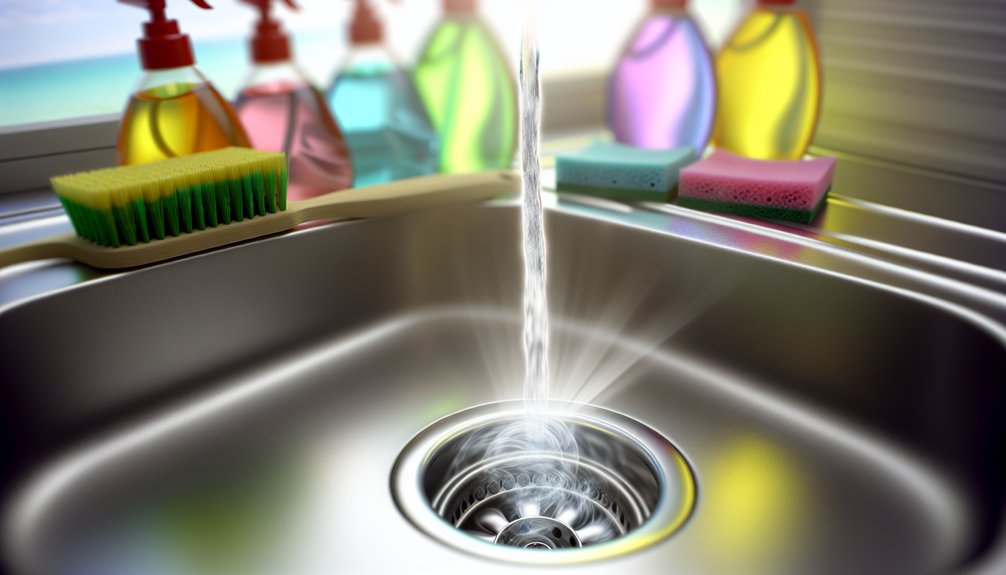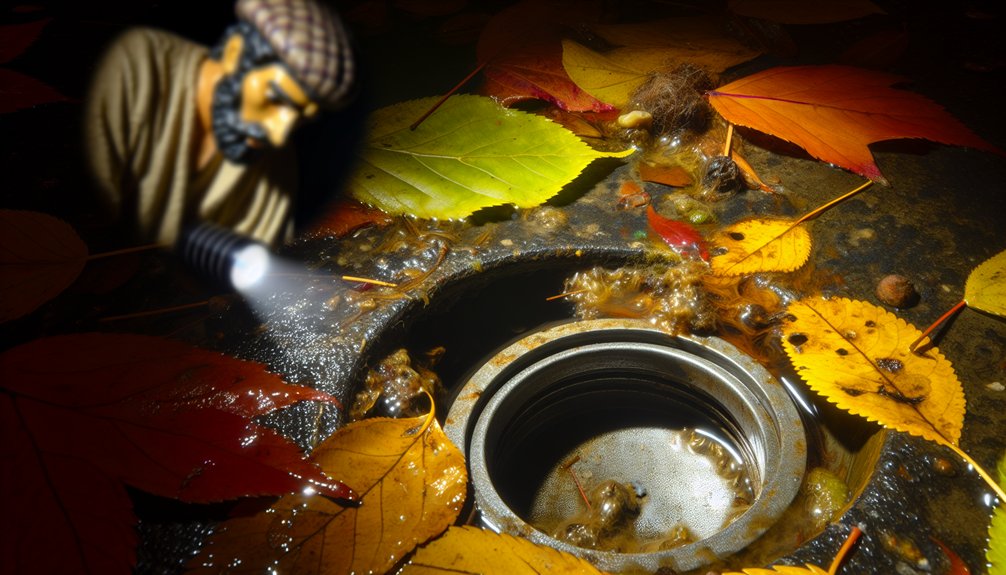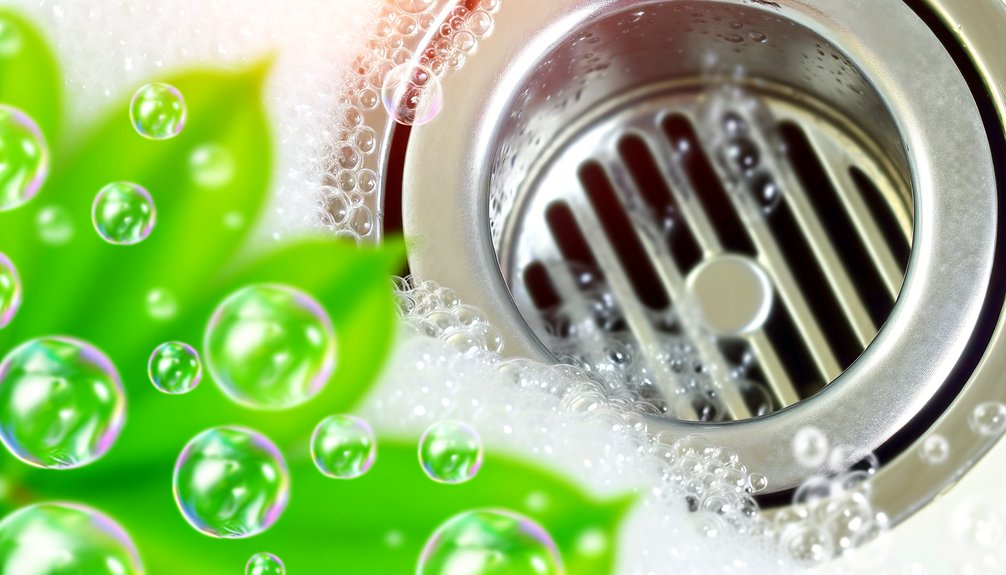Maintaining household drains regularly is essential to prevent clogs and prolong the lifespan of plumbing systems. Consistent cleaning minimizes the risk of water damage and costly repairs while ensuring efficient drainage. It also helps reduce unpleasant odors and potential health hazards. Recognizing warning signs early can prevent severe plumbing issues. Understanding effective DIY techniques and the importance of professional help further enhances drain care and overall household maintenance. More insights can be uncovered on this topic.
Effective DIY Drain Cleaning Techniques

When homeowners encounter slow or clogged drains, they can employ effective DIY drain cleaning techniques to restore proper function. One popular method involves combining baking soda and vinegar to create a natural cleaning solution. This mixture, when poured down the drain and allowed to sit for about 30 minutes, helps dissolve buildup before being rinsed with hot water. For more stubborn clogs, a plumber's snake can be utilized to break through larger debris that simple plunging may not address. Regular cleaning with boiling water helps to dissolve grease and soap scum, preventing standing water and foul odors. Additionally, using the correct type of plunger—either a cup plunger for sinks or a flanged plunger for toilets—can effectively dislodge clogs. Scheduling monthly maintenance with baking soda and vinegar guarantees drains remain clear and functional, minimizing the need for professional drain cleaning services.
Regular Maintenance Practices to Prevent Clogs
To prevent clogs effectively, homeowners should adopt regular maintenance practices that focus on keeping drains clear. A proactive approach includes rinsing kitchen and bathroom drains with boiling water to dissolve grease, soap scum, and hair buildup. Monthly applications of baking soda and vinegar serve as a natural method to break down debris while preventing unpleasant odors. Installing strainers in sinks and showers is essential to catch larger debris, thereby reducing the risk of blockages in drain pipes. Homeowners must also avoid pouring grease, oil, or fibrous foods down the drain, as these substances can solidify and lead to significant clogs over time. Additionally, scheduling professional drain cleaning at least once a year guarantees thorough drain maintenance and early detection of potential plumbing issues, ultimately promoting the longevity and efficiency of the drainage system. By implementing these practices, homeowners can successfully prevent clogs and maintain ideal drain functionality.
Recognizing Warning Signs for Early Intervention

How can homeowners guarantee their plumbing systems remain functional? Recognizing warning signs for early intervention is essential in maintaining household drains. Key indicators include slow draining water, gurgling noises, foul odors, and water pooling around fixtures. Prompt attention to these signs can prevent clogged drains, mitigating the risk of water damage and costly repairs. Regularly inspecting sump pump operation can also help ensure that excess water is effectively managed, further protecting your plumbing system.
| Warning Sign | Description |
|---|---|
| Slow Draining Water | Indicates potential blockages requiring cleaning. |
| Gurgling Noises | Suggests trapped air from clogs, needing intervention. |
| Foul Odors | Signals decomposing matter, posing health hazards. |
| Water Pooling | Clear indication of clogs, necessitating immediate action. |
| Ignored Signs | Can escalate to severe plumbing issues, increasing repair costs. |
Regular maintenance and cleaning of drains prolong the life of the plumbing system. Homeowners who prioritize recognizing these warning signs can effectively keep their drains functional and avoid future complications.
Frequently Asked Questions
Why Is It Important to Clean Drains Regularly?
Regular drain cleaning is essential for effective clog prevention, greatly reducing the risk of plumbing issues. It aids in odor control, enhancing household hygiene and overall indoor air quality. By maintaining ideal water flow, daily tasks become more efficient, while minimizing health risks associated with stagnant water. In addition, a robust maintenance routine leads to cost savings by preventing emergency repairs and extending the lifespan of plumbing systems, ultimately promoting a healthier living environment.
Why Is Drainage Maintenance Important?
Neglecting drainage maintenance can lead to a catastrophic cascade of plumbing problems, where water flow is reduced to a mere trickle and foul odors permeate the air. This negligence invites mold growth and pest infestations, creating significant health risks. Regular upkeep is essential for preventing property damage and ensuring cost savings over time. By following strategic maintenance tips, homeowners can avert the turmoil of severe drainage issues and protect their living environment from decay.
How Often Should Household Drains Be Cleaned?
Household drains should ideally be cleaned at least once a year, aligning with recommended drain cleaning frequency. Seasonal maintenance tips include using DIY drain solutions like baking soda and vinegar monthly. Signs of clogs, such as slow drainage, necessitate immediate attention. The comparison of professional services versus DIY methods reveals long-term benefits, including reduced impact on plumbing and health implications. Neglecting maintenance incurs costs, emphasizing the importance of proactive drain cleaning methods.
What Happens if You Don't Clean Your Drains?
When drains are left unattended, they may become a silent nuisance, leading to drain blockages and slow drainage. This neglect can result in unpleasant odors and water pooling, creating an inviting environment for pests. Additionally, prolonged stagnation encourages mold growth and accelerates pipe corrosion, posing health risks. Ultimately, these issues may escalate into emergency situations, requiring costly repairs that could have been easily avoided with regular maintenance. The consequences extend beyond inconvenience, affecting one's peace of mind.


